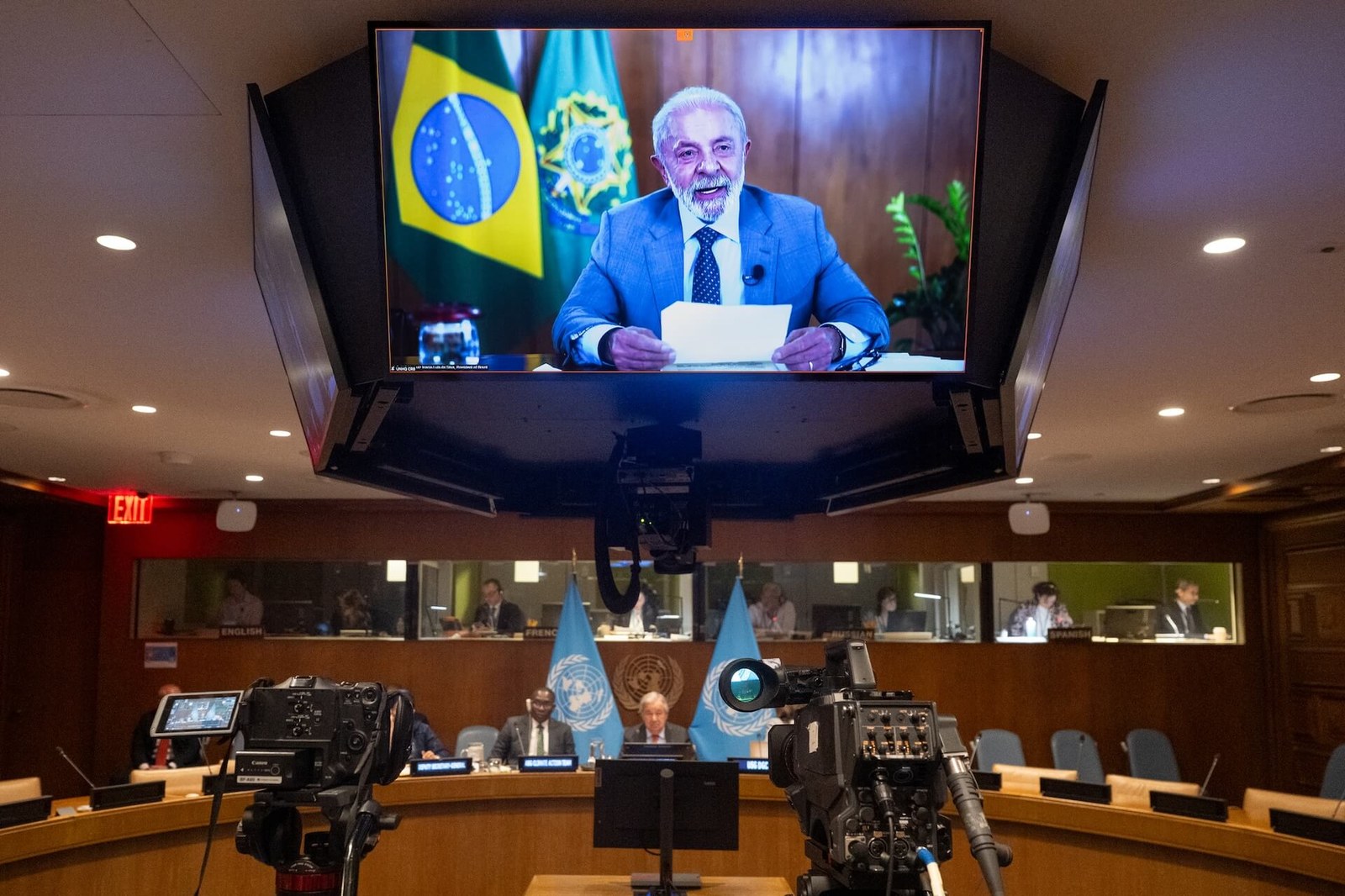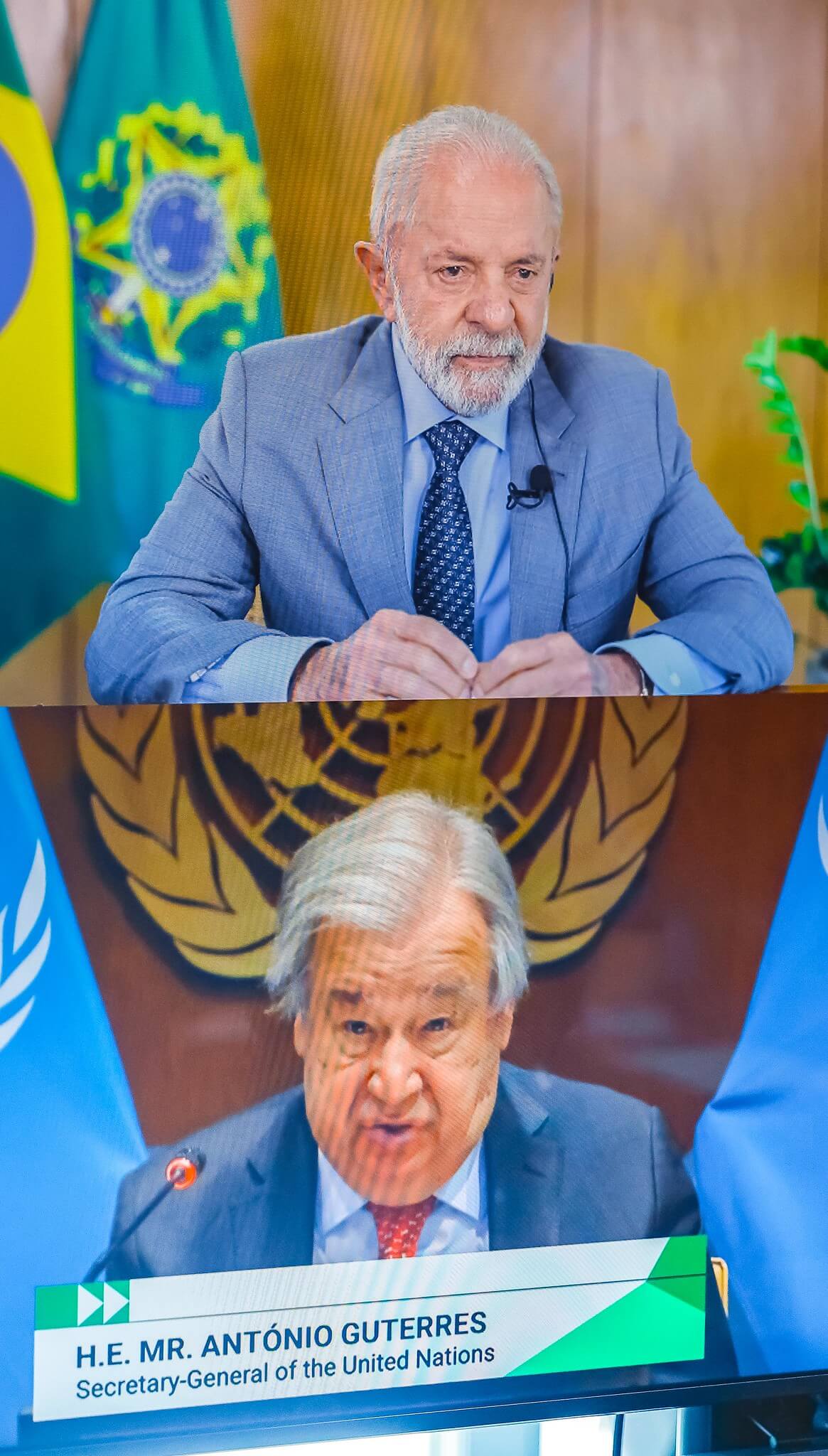International leaders, the Brazilian government and the UN are united in their call for more ambitious NDCs
On Wednesday, April 23, UN Secretary-General António Guterres and Brazilian President Lula led the Virtual Climate Ambition Summit as part of the pre-COP30 meetings.

By Franciéli Barcellos de Moraes | francieli.moraes@presidencia.gov.br
On Wednesday (23), the Virtual Climate Ambition Summit was held with representatives from Asia, Africa, the Americas, Europe and Oceania, hosted by UN Secretary-General António Guterres and Brazilian President Luiz Inácio Lula da Silva. The meeting brought together heads of state and government from the world's largest economies, as well as leaders from the African Union, the European Union, the Association of Southeast Asian Nations (ASEAN), the Alliance of Small Island States (AOSIS) and the Caribbean Community (CARICOM).
"The planet is tired of unfulfilled promises. This year, all countries must present their new NDCs with targets to reduce carbon emissions by 2035.”
A key issue on the agenda was the call for updated Nationally Determined Contributions (NDCs). So far, only about 10% of the 196 signatories to the United Nations Framework Convention on Climate Change (UNFCCC) have submitted their revised contributions. The original deadline was February, but was extended to September. NDCs are the targets set by each country to reduce greenhouse gas emissions and limit global warming to 1.5ºC, as set out in the Paris Agreement.
"We want to make COP30 a major collective effort to deliver on climate commitments. The planet is tired of unfulfilled promises. This year, all countries must present their new NDCs with targets to reduce carbon emissions by 2035," said President Lula during the meeting. He also stressed the undeniable reality of the climate crisis, calling multilateralism and internationalism "the cornerstones of the global response to climate change.

"Brasil was the first [to deliver], and the call was for the presentation of ambitious NDCs. That was the objective of the meeting; I think it was very successful, because it had a major impact with the attendance of important leaders. I think we achieved the target, and the press coverage of this meeting will make other countries mobilize and present their NDCs," said Brasil's Foreign Minister, Ambassador Mauro Vieira.
The presentation – as well as the fulfillment – of enhanced NDCs can not only prevent significant economic losses for countries, but also increase the global Gross Domestic Product (GDP) by around 3% by 2050 – and 13% by 2100. This is one of the structuring reports of the report “Investing in Climate for Growth and Development: The Case for Enhanced NDCs”, presented with preliminary data during the 16th Petersberg Climate Dialogue in Berlin, Germany, a preparatory event for the 30th United Nations Climate Change Conference (COP30), to be held in November in Belém, Pará.
Renewable energy – financing for developing countries
Two other issues highlighted at the Virtual Summit, under the auspices of the UN Secretary-General, were the transition from fossil fuels to renewable energy models and the responsibility of developed countries for transitions in developing countries.
The first explicit reference to the transition away from fossil fuels in a COP final declaration came at the 28th COP in Dubai, United Arab Emirates, in 2023, and it has been a focus of climate negotiations ever since. "The science is on our side, and the economics have changed. Renewable energy prices have plummeted and the sector is booming, creating jobs and boosting global competitiveness and growth. The road out of climate hell is paved with renewables," Guterres said.
Regarding financing the transition in developing countries, the Secretary-General again appealed to wealthy countries, citing data such as that from Africa. Despite having 60% of the world's best solar resources, Africa has only about 1.5% of installed solar capacity and receives only 2% of global investment in renewable energy. "Developed countries must deliver on their pledge to double adaptation finance to at least USD 40 billion per year by 2025. And we require significantly larger contributions, including innovative sources of finance, to support loss and damage funds," he said.
This year marks the tenth anniversary of the Paris Agreement, which established the essential role of supporting mitigation and adaptation actions in developing countries. In addition to governments, multilateral development banks, multilateral climate funds, and private channels are providing finance.
Call for key initiatives
At the Summit, Lula reinforced the call for four initiatives, which he said should pave the way to Belém in the coming months.
1. Global Ethical Assessment – Brasil and the UN will gather young and religious leaders, artists, indigenous peoples, scientists, and decision makers around a new pact with the planet.
2. Global Alliance AgainstHunger and Poverty – working with the Food and Agriculture Organization of the United Nations (Organização das Nações Unidas para Alimentação e Agricultura/FAO), to prepare a guide for the inclusion of social policies and food system transformation in NDCs.
3. Global Initiative for the Integrity of Information on Climate Change – In partnership with the United Nations Educational, Scientific and Cultural Organization (Organização das Nações Unidas para a Educação, a Ciência e a Cultura/UNESCO), this initiative aims to value science and combat misinformation.
4. Rainforests Forever Fund – To be launched at COP30, it will reward developing countries that preserve their forests.
"President Lula also called for COP30 to be the conference for the implementation of the agreements reached so far, especially those resulting from the Global Review that preceded the COPs, both in Dubai and Baku, in terms of tripling renewable energy, doubling energy efficiency, moving away from the use of fossil fuels and halting deforestation, in addition to the necessary climate finance, all in line with the mission not to exceed 1.5°C," concluded Brasil's Minister of Environment and Climate Change, Marina Silva.
English version: Trad. Bárbara Menezes
Proofreading by Enrique Villamil
